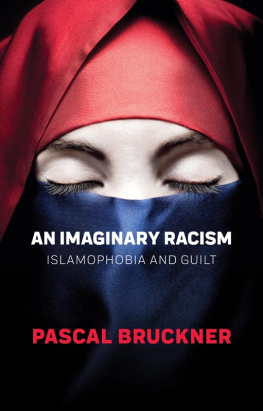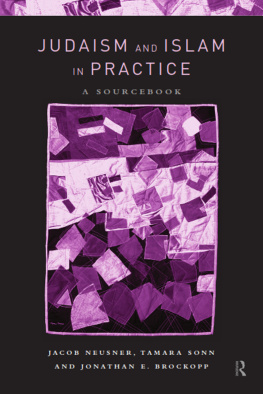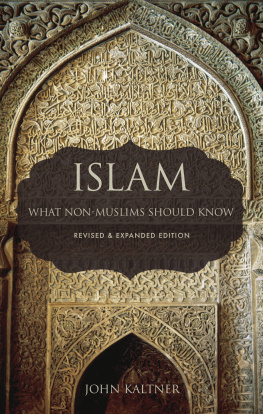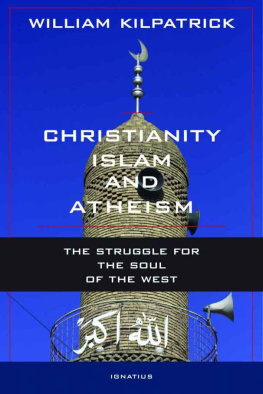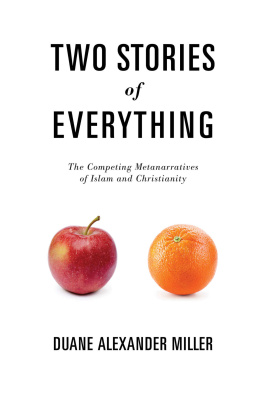
Dedication
For Patrice Champion, in memory of
Belgrade and Sarajevo
Copyright page
First published in French as Un racisme imaginaire. Islamophobie et culpabilit ditions Grasset & Fasquelle, 2017
This English edition Polity Press, 2018
Polity Press
65 Bridge Street
Cambridge CB2 1UR, UK
Polity Press
101 Station Landing
Suite 300
Medford, MA 02155, USA
All rights reserved. Except for the quotation of short passages for the purpose of criticism and review, no part of this publication may be reproduced, stored in a retrieval system or transmitted, in any form or by any means, electronic, mechanical, photocopying, recording or otherwise, without the prior permission of the publisher.
ISBN-13: 978-1-5095-3064-9
A catalogue record for this book is available from the British Library.
Library of Congress Cataloging-in-Publication Data
Names: Bruckner, Pascal, author.
Title: An imaginary racism : Islamophobia and guilt / Pascal Bruckner.
Other titles: Racisme imaginaire. English
Description: Medford, MA, USA : Polity, [2018] | Includes bibliographical references and index.
Identifiers: LCCN 2018001630 (print) | LCCN 2018029268 (ebook) | ISBN 9781509530663 (Epub) | ISBN 9781509530649 (hardback)
Subjects: LCSH: Islam--Public opinion. | Islamophobia--Western countries. | Islam--Western countries. | Islamic fundamentalism--Western countries. | Islam and politics--Western countries. | Political correctness--Western countries. | Racism--Western countries. | Western countries--Ethnic relations.
Classification: LCC BP52 (ebook) | LCC BP52 .B7813 2018 (print) | DDC 305.6/97--dc23
LC record available at https://lccn.loc.gov/2018001630
Typeset in 11 on 13 pt Sabon
by Fakenham Prepress Solutions, Fakenham, Norfolk NR21 8NN
Printed and bound in the United Kingdom by Clays Ltd, St Ives PLC
The publisher has used its best endeavours to ensure that the URLs for external websites referred to in this book are correct and active at the time of going to press. However, the publisher has no responsibility for the websites and can make no guarantee that a site will remain live or that the content is or will remain appropriate.
Excerpt(s) from JOSEPH ANTON: A MEMOIR by Salman Rushdie, copyright 2012 by Salman Rushdie. Used by permission of Random House, an imprint and division of Penguin Random House LLC. All rights reserved. Any third party use of this material, outside of this publication, is prohibited. Interested parties must apply directly to Penguin Random House LLC for permission.
Every effort has been made to trace all copyright holders, but if any have been inadvertently overlooked the publisher will be pleased to include any necessary credits in any subsequent reprint or edition.
For further information on Polity, visit our website: politybooks.com
A Note on the Text
This book is the outcome of many articles published since 2003 in Le Figaro, Le Monde, and Libration. I devoted about a dozen pages of The Tyranny of Guilt (Princeton University Press, 2010) to Islamophobia. I have also included here a lecture given at Indiana University, Bloomington, in 2012, and at Yale, on the inversion of the debt between anti-Semitism and Islamophobia. This lecture was published in English by Indiana University Press in 2015 in an essay collection edited by Alvin Rosenfeld under the title Deciphering the New Anti-Semitism. It appeared in France in the Revue des Deux Mondes in June 2014.
A new word had been created to
help the blind remain blind:
Islamophobia. To criticize the
militant stridency of this religion in
its contemporary incarnation was to
be a bigot.
Salman Rushdie, Joseph Anton
Introduction
A Semantic Rejuvenation
In 1910, Andr Quellien, a writer working for the French minister of the colonies, published a work entitled Muslim Politics in French West Africa. Addressed to specialists and imperial officials, it offers moderate praise for the religion of the Quran as practical and indulgent, and better adapted to the natives, whereas Christianity is too complicated, too abstract, too austere for the rudimentary, materialistic mentality of the negro. The author of this report thought it important to emphasize that so long as it was treated tactfully, Islam would become French colonialisms best ally and favour European influence and control. Because the religion of the Prophet wrests these peoples away from fetishism and its degrading practices, Quellien argued that it was imperative to stop seeing Islam as fanaticism and to treat it instead with a benevolent neutrality, thus foreshadowing the great Arabist Louis Massignon (18831962), a left-wing Catholic who specialized in Muslim mysticism and advocated dialogue between Islam and the Roman Catholic Church. Thus Quellien denounced the Islamophobia that was rampant among colonial officials, but he was just as opposed to the Islamophilia peculiar to Romantic orientalism: singing the praises of Islam is just as biased as describing it unjustly. Islam must be objectively considered as a tool for governing. Here, Quellien writes as an administrator concerned about social peace: he deplores the temptation to demonize a religion that keeps the peace in the empire, no matter what abuses minor ones, in his view it may commit, such as the continuing practices of slavery and polygamy. Since Islam is colonialisms best ally, its followers must be protected from the harmful influence of modern ideas and their ways of life must be respected (an attitude found today on the far left and in English-speaking countries).
During the same period, Maurice Delafosse, another colonial official residing in Dakar, wrote: Whatever may be said by those for whom Islamophobia is a principle of governing natives, France has nothing more to fear from Muslims than from non-Muslims in West Africa [...]. Thus Islamophobia has no more raison dtre in West Africa, where, on the other hand, Islamophilia (in the sense of a preference granted Muslims) is said to create a feeling of distrust among non-Muslim peoples, who are the most numerous.
Islamophobia: the term probably already existed in the nineteenth century, which explains its spontaneous use by imperial officials. As for its antonym, Islamophilia, whether erudite or popular, since the seventeenth century it has been a constant in European history, which is still massively fascinated by Islamic civilization. But after the Iranian Revolution of 1980 the expression Islamophobia underwent a mutation that weaponized it. Between the expulsion of the American feminist Kate Millet from Teheran in 1979 for having protested against the regimes requirement that Iranian women wear a veil, and the Rushdie affair in 1988, which exploded under the influence of British Muslims, this dormant word suddenly awoke and became active in another form. A word does not belong to the person who created it but to the one who reinvented it to make its use widespread. This lexical rejuvenation makes it possible to kill two birds with one stone: stigmatizing traitors to the Muslim faith, on the one hand, and shutting up godless Westerners, on the other.
In 1789 and again in 1791, France abolished the crime of blasphemy, which had caused centuries of conflicts between Catholics and Protestants (the Restoration later reinstituted another law against sacrilege that was intended above all to muzzle the press, but it was repealed during the July Monarchy and definitively abrogated in July 1881). In his report on the planned penal code, a member of the Constituent Assembly, Lepeletier de Saint-Fargeau, wrote that it was necessary to get rid of this crowd of imaginary crimes swelling the old collections of our laws. You will no longer find in them the great crimes of heresy, lse-majest, sorcery, or practising magic, for which, in the name of the divine, so much blood has soiled the earth. A magnificent proposal that might seem outdated today if so many obscurantist forces, led by UN-accredited lawyers and theologians from the Middle East, were not doing all they can to revive this crime of blasphemy, this oral crime that challenged the social and cosmic order and that under the Old Regime was often punished, in France and in Europe, by cutting off the offenders tongue, sewing his mouth shut, or even torturing and killing him. In the spirit of Lepeletier de Saint-Fargeau ridiculing blasphemy, we might describe the accusation of Islamophobia as imaginary racism. An untethered signifier in search of a use, this expression agglutinates at least two different meanings: the persecution of believers, which is obviously reprehensible, and the questioning of beliefs, which is practised in all civilized countries. Criticism of a religion falls within the domain of the spirit of examination but certainly not within that of discrimination. Striking a religious believer is a crime. Debating an article of faith, a point of doctrine, is a right. Confusing the two is an intolerable amalgamation.
Next page
